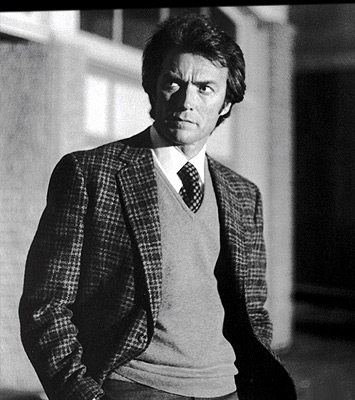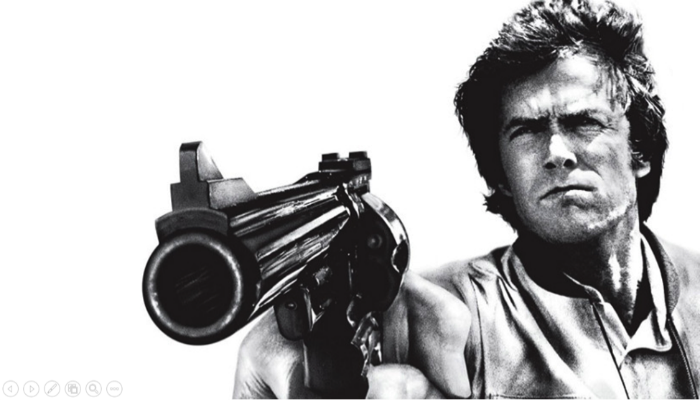
I did something I rarely do this week. I went to the mall and bought myself some new shirts.
Mostly my wife buys my clothes. If it were up to me I doubt I would even shave, let alone get dressed.
Anyhow, when it was time to wear one of my new shirts, I noticed there were no pockets. Where in the hell are the pockets!? Who ever heard of a button up shirt without pockets?
About then I said to my wife, “Run out and grab me a new wallet, would you honey?”
“Oh you can’t buy those anymore,” she said.
“Say what?”
“All they have now is those man purses you strap onto your belt. You’ve seen them haven’t you?”
Good grief. What’s happening to this world?
Well of course, the times, they are a changing.
In a lot of ways, I think, society is devolving.
Is that a word?
I think so.
Let’s play with it.
The world today is on a devolutionary spiral. Yes, that’s it.

Instead of valuing strength and individuality and independence, with real stakes, our increasingly androgynous world is descending into a mindless social media inspired follower-following-follower fantasyland where you cannot fail.
Where in the past, adults produced – or starved. Today, typing a 280 character Tweet is a major workout.
Call me a Pre-Neanderthal, but I just don’t fit in. I like to observe, but I swear I’m becoming more alien by the day.
My role models are Clint Eastwood-like characters like Dirty Harry and the man with no name.
Terribly politically incorrect these days, I know.
But I think there’s still a lot we can learn from the man and the characters he played. Not to be model citizens of the social media age, of course, but certainly as entrepreneurs.
For starters, the man was virtually immune to criticism. In his early career, directors demeaned Eastwood as amateurish. “He didn’t know which way to turn or which way to go or do anything”.
Other Hollywood fairies were critical of the way he talked, calling him cold, stiff, and awkward. One of his fellow actors called him a hayseed: Thin, rural, slow, with a prominent Adam’s apple.
Nowadays, one little word of dissent from the virtual rabble is enough to send people running home to Mommy, but not Clint.
He persisted, auditioning for no less than 9 different bit parts before finally landing a minor role. How many androgens nowadays are ready to go through that kind of rejection? Who wants to put in the effort?
Young Clint worked like a banshee.
By day as “the super” at the apartment building where he lived … pumping gas by night … acting school … auditions.
Gradually, through sheer iron-willed determination, he kicked and clawed and scratched his way into a living as a b roll actor, appearing in dozens of forgettable TV spots.
Finally, he won a small part as an aviator in the French picture, Lafayette Escadrille.

Then he played an ex-renegade in the Confederacy in Ambush at Cimarron Pass. At the premiere, he’s quoted as saying “It was sooo bad. I just kept sinking lower and lower in my seat and just wanted to quit”.
But he allowed himself to suck, pulled himself together, and persevered. How uncharacteristic in our modern day world.
It took Clint five long years of struggle to finally hit pay dirt, playing the role of Rowdy Yates on a new television series called Raw Hide. Within weeks Rawhide hit top 20.
From that point forward, Clint’s career accelerated. He accepted a low paying role with an unknown Italian director named Sergio Leone. The film was a Spaghetti western called, A Fistful of Dollars.
Critics loathed it.
They called it “excruciatingly dopey” and “the most expensive, pious and repellent movie in the history of its peculiar genre”.
With this film, the dark brooding character archetype that so many in my generation relate with so strongly began to emerge. Eastwood played “the man with no name” in what became a trilogy.
After A Fistful of Dollars, came For a Few Dollars More, and then the film that would become Clint’s breakthrough performance, The Good, the Bad, and the Ugly.
“I wanted to play it with an economy of words and create this whole feeling through attitude and movement. It was just the kind of character I had envisioned for a long time, keep to the mystery and allude to what happened in the past. It came about after the frustration of doing Rawhide for so long. I felt the less he said the stronger he became and the more he grew in the imagination of the audience.” – Clint Eastwood
To create “the look” Eastwood bleached and roughed up a pair of black jeans he purchased on Hollywood Boulevard, wore a distinctive Spanish style hat, and sported a leather bracelet and two Indian leather cases with dual serpents containing the trademark black cigars.
And so he became …
The anti-hero
“The loner, operating by himself, without benefit of society. It usually has something to do with some sort of vengeance; he takes care of the vengeance himself, doesn’t call the police. Like Robin Hood. It’s the last masculine frontier.” – Clint Eastwood
This fiercely independent character archetype found its expression repeatedly in such greats as Hang ‘em High, The Outlaw Josey Wales, Unforgiven, Two Mules for Sister Sara and of course the Dirty Harry series. And as they say, the rest is history.

Eastwood and his signature character embody the entrepreneurial, take-no-prisoners spirit so crucial for success.
“Dustin Hoffman and Al Pacino play losers very well. But my audience likes to be in there vicariously with a winner. That isn’t always popular with critics. My characters have sensitivity and vulnerabilities, but they’re still winners. I don’t pretend to understand losers. When I read a script about a loser I think of people in life who are losers and they seem to want it that way. It’s a compulsive philosophy with them. Winners tell themselves, I’m as bright as the next person. I can do it. Nothing can stop me.” – Clint Eastwood
A control freak of epic proportions, Eastwood insisted on creating his own rules … eventually setting up Malpaso Productions where he directed and produced many of his own films. He even wrote the musical score for a couple of them.
At 88 years old, he is still active, has never tired of taking risks, and endured as many box office flops as he has enjoyed blockbuster successes.
So what business and marketing lessons can we infer from this story of an American legend?
Nobody is born brilliant: The superstars in your field make it look easy, but they were once as inept as you are now. Nothing worthwhile comes without repeated failure, and disappointment, and the willingness to carry on in spite of it.
Humiliation is the price of victory: If you’re not out there trying your heart out, knowing full well that you suck – you’re never going to be successful. There comes a time when learning and practicing must give way to getting your teeth kicked in on the mean streets – the sooner the better.
Don’t be afraid to ruffle a few feathers: Clint was a constant target. If it wasn’t artsy fartsy film critics, it was women’s groups, or cinematic censorship Nazis. Feminists in particular were outraged by Dirty Harry and protested outside the 1971 Oscars, marching up and down the street, holding up “Dirty Harry is a Rotten Pig” banners. The question you’ve got to ask yourself is this: If you’re not pissing somebody off somewhere, what are you doing wrong?
Work is NOT a dirty word: Getting good takes effort. Don’t go along with the spoiled rotten losers that make up the majority today. Cherish every moment of your labor with the knowledge that so few are willing to do what’s necessary to win.
Own your own media: One of the most alarming things I see happening in marketing today is the amount of time and effort people are pouring into acquiring friends and followers instead of subscribers and customers. Why are people so excited about building lists for Facebook and Twitter instead of lists of their own?
Keep taking risks: Realize that whatever success you have today is fleeting. You can’t hold on to success any more than you can suck in a deep breath and hold it in. If you’re not willing to risk your current success by constantly reinventing yourself in a relentless quest for new success, you’ll eventually lose it.
I’m sure there are more, but these six are pretty dang good ones.
Comments on this article? Criticisms?
Go ahead, make my day.
I loved this article, and I am sure my students will love it too… can I put it on my site, of course crediting you as author?
By the way, I am now sure that I made a mistake when I didn’t sign up your program last week. I am Dirty Harry, but even Dirty Harry needs guidance from time to time.
Liked how you shifted focus from opinion to character study followed by powerful (magnum) bullets
Awesome post, most my age grew up on the “Dirty Harry” films, he was the “anti-hero” hero of my generation.
Loved the article Daniel! I especially like the idea of ‘trying your heart out, knowing full well that you suck’.
I’m a rookie copywriter and improvisor and am currently facing some sizeable challenges in my confidence.
This is the coal face, where one decides whether to soldier on knowing that you suck or to give up. It’s character building and I know which one I prefer. More sucking please!
Well said!
I want to suck as bad as Clint!
Oh Shoot! That means I’ll have to be more persistent…
O.K I will give it a shot.
Amen! Loved the post Daniel.
Thank you.
Your essay is as timely as it’s inspirational.
Your observation of the devolution of our civilization amid its many discontents is right on the money as is your prescription for an individual-based, positive response in the tradition of Emersonian self-reliance.
Hi Daniel
I loved the bullet points
from nobody is born brilliant on.
There is a whole seminar in those.
I am going to try to explain these points to my 15 year old
who in my opinion is as are most kids of that age afraid to try something for fear of failure and negative comments from peers. You may remember the famous golfer who when it was said after a great shot ” lucky shot ” he replied amazing is`nt it the more I practise the luckier I get
Great Article! I agree that one can learn a lot from the ‘oldies’ most people today want to do everything the easy way. I like that you used a movie star – I wrote a blog on writing for your blog using Shirley Valentine and the way she used to talk to the wall to express herself, I sugested that we need to do that when writing blogs.
I look forward to more like this
Well written.
Daniel,I too am considered “politically incorrect”. The fact is life is no longer as we knew it…however, we have to adjust. My high schools’ motto was Fortis cadere cedere non potest”…which meant, “The Brave May Fall, But They Will Never Yield”.
Cheers.
Great Article! Loved Dirty Harry and all the other films Eastwood has been in. He is a character that we all need to gleen a few lessons from for life (not the killing part, of course), but the tough as nails, devil may care part. 🙂
Good stuff, I am of a similar generation and from an even more macho environment in Southern Africa. I feel like a lost, politically incorrect conservative in liberal Canada.
I would add 2 more to your list, “to thine own self be true” which sort of encompasses all the others and “don’t be attached to the outcome” when you have honestly tried your absolute best and still come up short, don’t whine and complain, just pick yourself up and start again.
Reading your post gives me some hope for the future of our country and in fact for Western society, don’t get much of that on Facebook.
Hi everyone. Thanks for your positive comments. Great to see so many of us share the same positive values and ideals.
Inspiring and tells that story of character! The one statement especially hit home … “The question you’ve got to ask yourself is this: If you’re not pissing somebody off somewhere, what are you doing wrong?” of course, I added “are you feeling lucky”
OK Punk
You made my day.
Hi Daniel
You’ll get no debate from me, only a standing ovation.
I’m 67 and grew up fantasising I was James Bond.
Dave
Hi Daniel,
Thanks for the post…it is so useful and inspirational !!
Solomon
Never quite understand why, but as I grew up, I always prefered the bad guys… always taking a stance for themselve and going against the many…following there own rules. But it wasent about there action…it was more about the caracter, the darker nature of the persona. Your article bring me back to those day but now I understand that my rebellious nature was already taking shape at such an early age…I never quite buy into…going to school, getting a job…and following the system. Than you for this great article, my favorite part is… ”Humiliation is the price of victory”
I found your blog inspirational today. I am in the midst of a start-up in internet marketing and sometimes feel a little overwhelmed with all the “stuff” I have to learn. There are days I feel like a goose being stuffed for fois gras. The not giving up part gave me the little lift I needed by the reminder. Thanks.
The first Eastwood movie I saw as a young kid was “The Good, the Bad and the Ugly”, fortunately, because I fell in love with him. He remains a hero with me till today; I think he gets better and better as he gets older – I enjoyed the Dirty Harry series, “In the Line of Fire”, “Million Dollar Baby”, “The Unforgiven”, etc. Yessir, Daniel, what you say really does reverberate with me. It went ahead and made my day.
I’ve often wondered what others thought of the anti-hero. He’s usually the most ethical character in the piece. But it isn’t just the anti-hero who gives you that feeling. The first time I encountered this was watching Jeremiah Johnson, the classic Redford film from the 60’s. He was a mysterious and uncompromising loner, but with the bearing of a king out of place.
All of the other issues you mention above are in this character as well. I doubt Johnson would have tweeted his status after downing a Grizzly bear…
Excellent. But I believe it is “The Outlaw Josey Wales.” One of my favorites. Eastwood is also an excellent director.
Right you are Jeff. Sacrilege. It shall be fixed.
Thanks for a great article and the best I have read this year. I wish I had known about your work when I started online back in 2006.
Agree with the comments, I plan to keep this article handy for some inspiration when I need it, thanks much, Daniel- exceptional!
“Yep.”
Daniel
As always exceptional. Consider this. Clint wanted to open a Restaurant and as often happens obstacle after obstacle was thrown at him. At a City Council meeting he made this Declaration, either you are going to help or I am going to run for Mayor and Change the Rules Myself. He Did and as Mayor he opened his Restaurant. I like his style and have used it to survive what I have been through and doing. Dig Under, Climb Over, or Plow Through. Don’t Quit.
Your Work and Talent is Recognized by me and Greatly Appreciated by me and I am certain many many others. I agree as to pockets as well.
I hated Rowdy Yates, but I really enjoyed the spaghetti westerns, sappiness and all. But what I like the most about Eastwood is his undying determination to be himself and do it his way. I admire that about anyone and especially in the stamp-out culture of Hollywood.
I appreciate your skillful use of NLP to help those of us who keep on keeping on in the face of criticism, reproof, and failure. Those are stepping stones most people see as road blocks.
For most of us saying less and learning more is the key to future success.
You missed High Plains Drifter, my favourite
Excellent article, Daniel! The photo of Devo was great when speaking of devolving! And yes, that’s a word. I just read the report about human intelligence steadily declining after peaking in the early ’70s. When combined with the lack of meaningful action and commitment we see in the world today, and the rise of augmented intelligence, that doesn’t bode well for the species.
I don’t understand why feminists don’t like a man on the trail of a sadistic serial killer who murdered two young women. I don’t think there’s a reasonable answer.